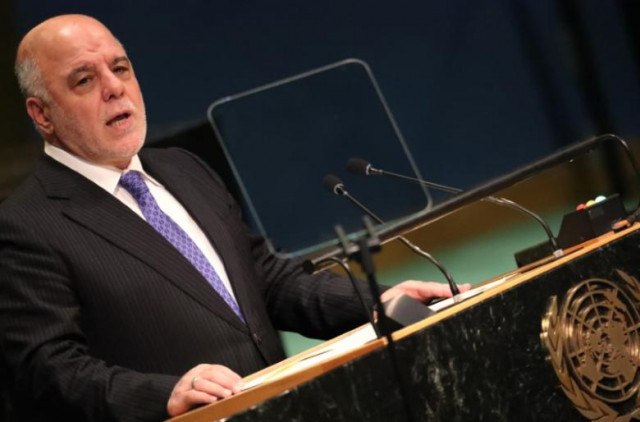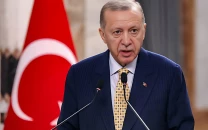Iraq rejects US call for Iran-backed forces to end operations
Washington is concerned Iran will use its expanded presence in Iraq and in Syria to expand its influence in the region

Prime Minister Haider Al-Abadi of Iraq. PHOTO: REUTERS
The paramilitary units have been expanding their reach to northern Iraq, supporting government forces which seized the Kurdish-held city of Kirkuk one week ago in a lightning advance in retaliation for a referendum on independence.
Iraqi forces are deploying tanks and artillery just south of a Kurdish operated oil pipeline that crosses into Turkey, a Kurdish security official said, the latest in a series of Iranian-backed operations against the Kurds. Speaking after a meeting on Sunday with Iraqi Prime Minister Haider al-Abadi and Saudi Arabia's King Salman, Tillerson said it was time for the Iraqi Popular Mobilisation forces and their Iranian advisers to "go home".
Saudi envoy comments on Iraq's Shia militias draw hostile reactions
US seeks to contain Iranian influence
Washington is concerned Iran will use its expanded presence in Iraq and in Syria to expand its influence in the region. But Abadi showed unwillingness to meet Tillerson's demand.
"No party has the right to interfere in Iraqi matters," a statement from his office read. It did not cite the prime minister himself but a "source" close to him.
Predominantly Shia Iran and its Sunni rival Saudi Arabia are locked in a proxy war for influence in the Middle East.
The international battle against Islamic State fighters in northern Iraq since 2014 saw the United States and Iran effectively fighting on the same side, with both supporting the Iraqi government against the militants.
Eid holiday dedicated to 'martyrs' in Iraq's Valley of Peace
Washington has 5,000 troops in Iraq, and provided air support, training and weapons to Iraqi government forces, even as Iran armed, trained and advised the Shia paramilitaries which often fought alongside the army.
But the latest twist in the Iraq conflict, pitting the central government against the Kurds, is trickier for US policymakers. Washington still supports the central government but has also been allied to the Kurds for decades.
Iran exhibited its sway over Baghdad's policies during tensions over a referendum last month in which the semi-autonomous Kurdistan region voted to secede from Iraq against Baghdad's wishes, Kurdish officials say.
Baghdad responded to the vote by seizing the oil city of Kirkuk, which the Kurds see as the heart of any future homeland. Major-General Qassem Soleimani, commander of foreign operations for Iran's elite Revolutionary Guards, repeatedly warned Kurdish leaders to withdraw from Kirkuk or face an onslaught by Iraqi forces and allied Iranian-backed fighters, Kurdish officials briefed on the meetings said.
New US base in Iraq draws more Islamic State fire, militia threat
Iraq's Sunni neighbours, including Saudi Arabia, share Washington's concerns over Iran's influence in Iraq, where the population is predominantly Shia.
The office of Abadi said the paramilitary forces were under the authority of the Iraqi government. "Popular Mobilisation are Iraqi patriots," it said in the statement.
Iran dismisses Tillerson remarks
Iran's Foreign Minister Mohammad Javad Zarif also rejected Tillerson's statement. The paramilitaries could not go home because "they are at home" already, he was quoted as saying by the state news agency IRNA.
Abadi has asserted his authority with the defeat of Islamic State in Mosul and the Iraqi army's sweep through Kirkuk and other areas which were held by the Kurds.
The buildup at the Kurdish oil export pipeline is taking place northwest of Mosul, an official from the Kurdistan Regional Government's (KRG) security council said.
US Air Force says plans test F-35 deployment this month
The loss of Kirkuk dealt a major blow to the Kurds, who had been steadily building an autonomous region in northern Iraq
since a US-led invasion toppled Saddam Hussein, who oppressed them for decades.
"We are concerned about continued military build-up of Iraqi forces and Iranian-backed Popular Mobilization Forces towards the Kurdistan Region," said the Kurdistan Region Security Council (KRSC) in a statement.
Elections for Iraq's Kurdistan region's presidency and parliament set for Nov 1 will be delayed because political parties failed to present candidates, the head of the electoral commission Hendrean Mohammed told Reuters.
Parties have been unable to focus on the elections because of turmoil that followed the referendum, a Kurdish lawmaker said on condition of anonymity.




1725099588-0/BeFunky-(41)1725099588-0-208x130.webp)














COMMENTS
Comments are moderated and generally will be posted if they are on-topic and not abusive.
For more information, please see our Comments FAQ